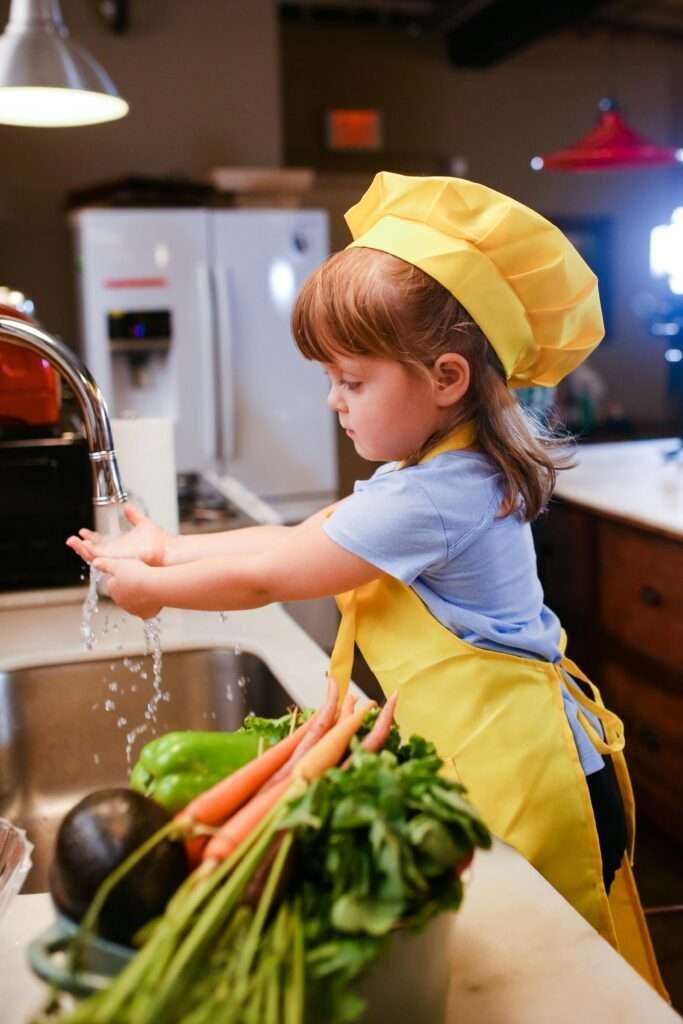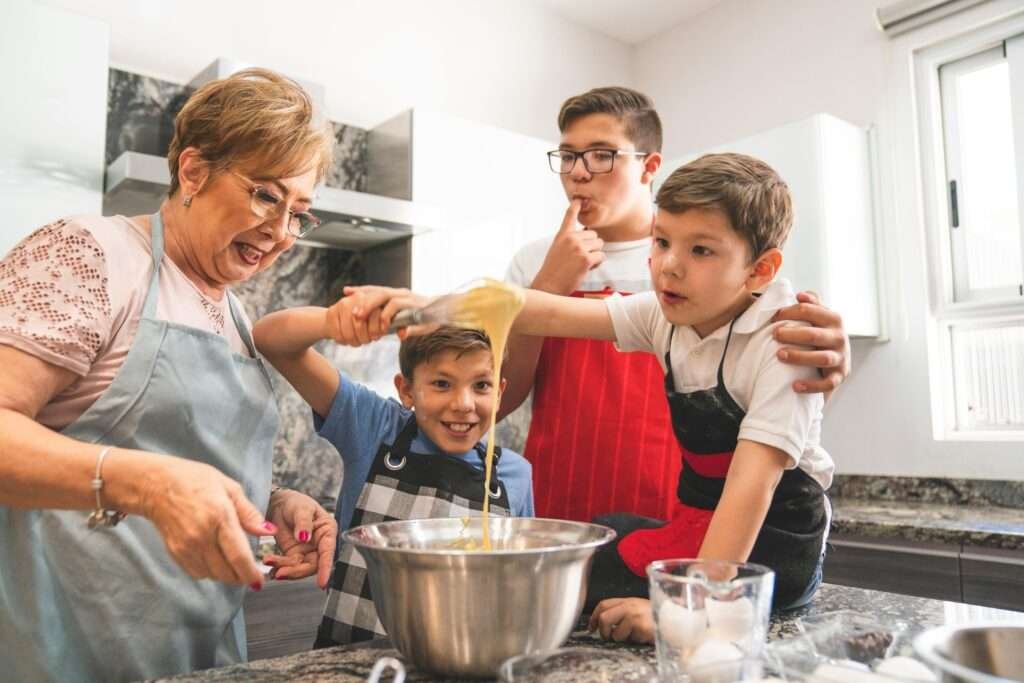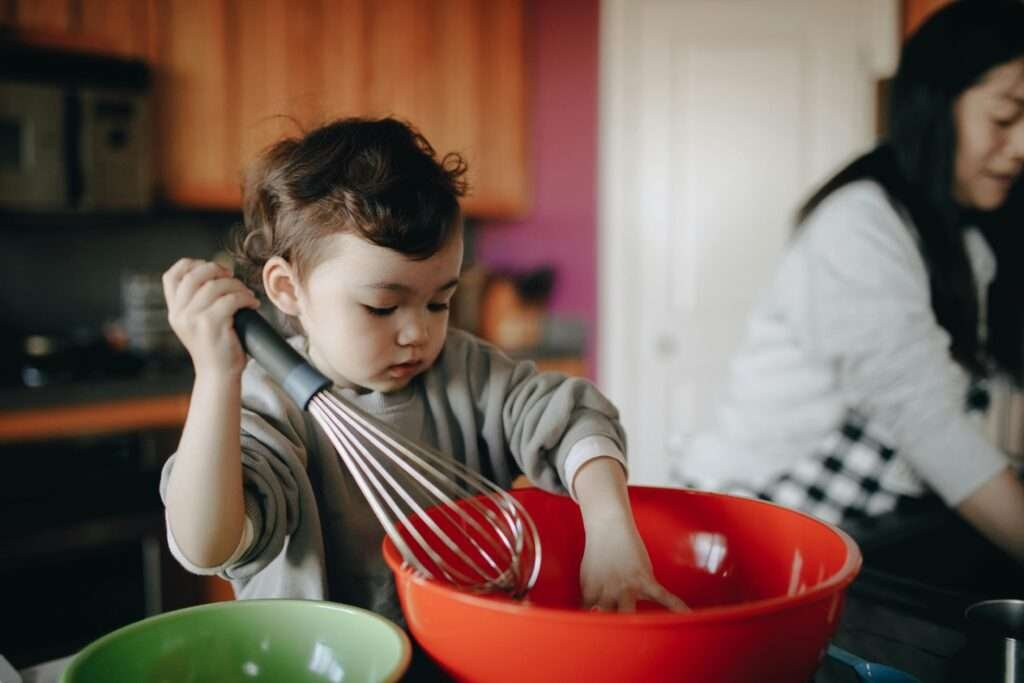Childhood is the best time to learn anything. A child can adopt any skill at an early age. And we should teach them basic life skills. In today’s blog, we are going to discuss learning cooking for our little angels. Encouraging kids to learn how to cook from an early age not only prepares them for adulthood but also provides a range of educational, emotional, and developmental advantages.
Life Skills

Cooking is an essential life skill for human beings, and it’s better to acquire this skill from the beginning, like in childhood. There are several benefits of learning cooking for kids. It is a skill that will serve them throughout their lives, helping them be independent and self-sufficient. By engaging in cooking, children can gain numerous insights into nutrition, meal planning, and food safety. They can also learn about home management by observing their mother as she organizes and balances her career and home life. In the future, these kids will be able to prepare themselves for adult responsibilities.
How cooking build confidence in a child?

By creating anything constructive or acquiring any skill and saying that “I can do this” or “I can do that,” a person gains another level of confidence. Successfully preparing a dish gives children a sense of accomplishment and boosts their self-esteem. Starting to cook from childhood, day by day they become masters in preparing food and can also prepare themselves for a future profession. In professional life, they can define themselves easily because they know things broadly.
Phycological Wellbeing

For children, it’s important to teach them how to be well from the inside. Cooking is one process that can help give a child the right direction. This process helps relieve stress for a child. Cooking helps children express themselves creatively. This creativity can have a positive impact on their mental health and emotional well-being. I always say cooking is a form of meditation.
Helps to physical development

When you chop an onion or a vegetable, this activity helps you create coordination between hand and eye and develop your motor skills. It’s a great idea to engage kids in cooking for these developments. These activities require precision and control, which can enhance a child’s dexterity and physical abilities. Cooking demands the focused attention of the eyes, ears, and sense of smell. It’s a great chance to enhance these senses by engaging in cooking for kids.
How cooking helps to buildup relationship?

It’s important to foster quality time and create shared experiences to build relationships within families. By cooking with family, children get the opportunity to engage in mindful conversation, collaborate on tasks, and understand the importance of teamwork. This collaborative effort enhances communication and strengthens the parent-child bond. The kitchen is a place for learning, teaching, and mutual support. Parents can teach life skills and values.
What Else do Children Learn from Cooking?

Additionally, the kitchen can be a place for children to enhance their academic skills. It integrates language, math, science, and creativity. When children read recipes to learn cooking, they improve their literacy and comprehension skills. Measuring ingredients and understanding proportions enhance math abilities, while observing the chemical reactions that occur during cooking can spark an interest in science.
Fun!

Cooking is always a fun activity. Children can play with food in a productive way. Through play, children can learn to make something. Children enjoy learning and experimenting with different ingredients, flavors, and colors, which allows them to express their creativity in a tangible way. Decorating food or garnishing dishes is like playing with colors in painting. They see vibrant ingredients, hear the sizzle of food, feel different textures, smell aromatic spices, and taste their culinary creations.
Social-Emotional Benefits

Cooking is a fun yet patient job at the same time. It teaches children the importance of following instructions, taking responsibility, and preparing themselves for teamwork. These are all social-emotional benefits. Children learn to handle frustration when a recipe doesn’t turn out as expected and celebrate successes when it does. If they fail, they try again to succeed, like when a dish gets burned once. It’s an important life skill.
How to Start Cooking with Your Kids

It would be better to start involving them in meal preparation according to their age. Create a safe and secure dedicated place for your child. Let them feel the vibe of a positive environment where they can make mistakes and learn from them. Encourage them to start with cleaning and easy recipes, and most importantly, make it a fun and rewarding experience for both you and your child. Help them, support them, and encourage them to create something new.
Suitable age for tasks
| Age | Suitable job |
|---|---|
| 3-5 years old | 1. Wash procedure 2. Wipe countertops 3. Help add ingredients to recipes 4. Mix batters 5. Help set dishes on table 6. Measuring dry and liquids ingredients with measuring cups and spoons such as flour, milk, water |
| Age | Suitable job |
|---|---|
| 6-7 Years old | 1. Use peeler to peel fruits 2. Crack egg into bowl 3. Measure ingredients 4. pouring liquids 5. Wash small dishes 6. Cut herbs or green onion with kitchen scissors 7. Kneading dough 8. Whisking eggs 9. Helping with clean-up |
| Age | Suitable job |
|---|---|
| 8-9 Years old | 1. Meal planning 2. Helping with shopping list 3. Making their won school lunch 4. Reading recipe and try to follow 5. Using small tool such as can opener, vegetable cutter 6. Start from simple dish such as scrambled eggs 7. Cracking and separating eggs 8. Helping wash the dishes |
| Age | Suitable job |
|---|---|
| 10-12 Years old | 1. Chopping with a knife 2. Making simple dish such as noodles 3. Baking pies, breads, cup cake 4. Frosting and decorating cakes 5. Preparing omelets 6. Experiment with dishes |
We invest many things in our children. Teaching any life skill can be a great investment for them, as discussed above with cooking. Identify the right age of your child and give them suitable culinary tasks. This will prepare them for future survival situations and provide them with social and emotional benefits.
